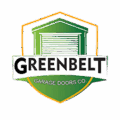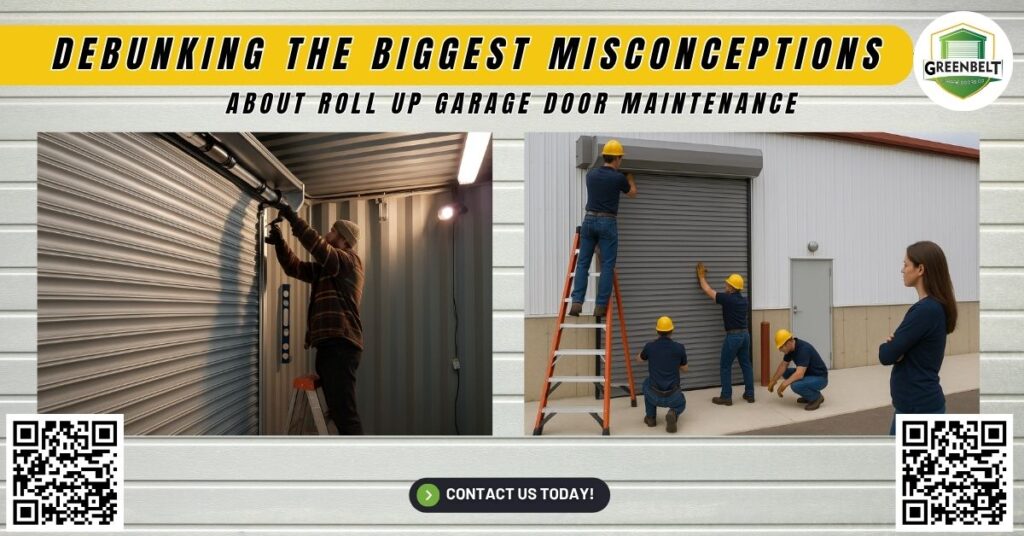When Mr. Carter from Garland called us at Greenbelt Garage Doors Co., he was frustrated. His roll-up garage door was getting noisy and slow, and he feared the worst. A full door replacement. But our technician quickly spotted the real issue: a dry, poorly lubricated roller track and some worn-out weather stripping. After a tune-up and a bit of care, the door was running like new no costly replacements needed.
Many homeowners in Garland and across Texas believe that garage doors, especially roll-up doors, are completely maintenance-free. But this is far from true. Statistics show that over 70% of garage door failures are due to avoidable maintenance issues like worn-out springs, misaligned tracks, and neglected insulation.
At Greenbelt Garage Doors Co., we want to set the record straight. Whether you’re dealing with a steel garage door, a custom insulated garage door, or a basic roll-up unit, regular upkeep is key. Let’s uncover the biggest myths and the truth about maintaining your roll-up garage door.
Roll Up Garage Doors Are Maintenance-Free – False!
Many people think that roll-up garage doors, often made of steel, aluminum, or fiberglass, don’t require upkeep. Because they appear tough and industrial, folks assume they’re “set it and forget it.” But like any mechanical system, your garage door relies on moving parts, springs, rollers, panels, and tracks, which are subject to wear and tear.
Proper maintenance helps avoid:
- Stuck or jammed doors
- Loud noises
- Increased energy loss due to worn insulation material
- Expensive emergency repairs
Regular care increases energy efficiency by keeping insulation in place and reducing air leaks, especially during hot Texas summers and chilly winter nights.
WD-40 is the Best Lubricant, Not Really
Here’s a popular garage myth: spraying WD-40 on everything will fix it. While WD-40 is good for stopping squeaks short-term, it’s not ideal for long-lasting lubrication.
For your garage door rollers, hinges, and tracks, we recommend:
- Silicone-based sprays for clean lubrication
- Lithium grease for smoother operation
- Products made for garage door parts (check your garage door opener manual)
Using the wrong product can attract dust and grime, causing parts to wear down faster and reducing the lifespan of your door.
Noisy Roll Up Doors Mean They’re Broken – Not Always
Noise doesn’t always mean disaster. Many garage doors begin to creak and groan simply because they haven’t been maintained properly. If your roll-up door sounds like a rusty gate, it might be due to:
- Loose or rusted hardware
- Dry or misaligned rollers
- Worn-out insulation kits or seals
In most cases, these issues can be fixed quickly without needing to replace the entire system. Noise reduction is often as simple as a tune-up.
Roll Up Doors Are Only for Commercial Use – Not Anymore
Many homeowners still associate roll-up doors with warehouses or storage units. But modern roll-up garage doors are stylish, insulated, and space-saving, perfect for residential garages.
Options now include:
- Insulated doors with polyurethane or polystyrene foam
- Stylish finishes that match your home’s curb appeal
- Compatibility with Chamberlain, Craftsman, and smart garage door openers
Whether it’s a sectional door, single door, or a full insulated garage, roll-up options are gaining popularity for homes in Garland.
If It Opens, It’s Fine – Not Quite
Just because your garage door opens and closes doesn’t mean it’s in perfect shape. Some underlying problems might not be obvious:
- Frayed cables
- Bent panels
- Cracked insulation
- Logic board delays in the opener
- Poor u-value, leading to poor heat insulation
These issues often go unnoticed until the garage space becomes too hot, too cold, or too loud, costing you in energy bills and comfort.
Insulation Doesn’t Matter in Texas – Wrong
Think insulation isn’t necessary in a warm state like Texas? Think again. Properly insulated garage doors reduce the amount of heat transfer in both summer and winter. This helps maintain better temperature control, especially if your garage is attached to your home.
Key insulation types:
- Polyurethane foam: High R-value, best for extreme temperatures
- Polystyrene foam: More affordable, easy to install
- Batt insulation or rigid foam kits: Great DIY options
An insulated garage door helps you:
- Lower energy loss
- Reduce outside noise
- Protect stored items from heat or cold
- Improve your home’s energy efficiency and return on investment
DIY Maintenance Is Enough – Not Always
While it’s good to perform monthly visual checks, some tasks need professional attention. For example:
- Spring adjustments are dangerous and should only be handled by experts.
- Diagnosing logic board or opener issues takes special tools.
- Insulation problems may require full panel removal.
Let a trained technician from Greenbelt Garage Doors Co. handle the heavy lifting to avoid injuries or further damage.
Only Fancy Homes Need Energy-Efficient Doors – False Again
Every home, no matter the size or style, can benefit from energy-efficient garage doors. Whether it’s a new garage door or an upgrade using insulation kits, making your door more efficient saves money in the long run.
Energy-efficient doors help by:
- Blocking heat in the summer
- Sealing cold in the winter
- Offering better noise reduction
- Increasing your home’s value
From Clopay to Amarr and Martin Garage Doors, today’s top brands offer a wide range of insulated options.
You Can’t Improve Older Roll Up Doors – Yes, You Can
Even if your roll-up door is a few years old, there are upgrades you can do:
- Install new insulation kits
- Replace weather seals and bottom panels
- Add a smart opener or safety features
- Paint or refinish for better curb appeal
Small upgrades can go a long way in improving performance, comfort, and appearance.
All Garage Door Insulation Is the Same – NO
Let’s talk insulation:
- R-value: Measures how well the insulation resists heat flow (higher is better)
- U-value: Measures heat transfer rate (lower is better)
- Polyurethane: Higher density, better insulator
- Polystyrene: Cheaper, but lower R-values
- Styrofoam kits: Simple DIY, but not ideal for extreme climates
Choose the insulation type based on your home’s needs, garage use, and budget. We offer a step-by-step guide for homeowners looking to compare options.
How Can Greenbelt Garage Doors Co. Help You?
At Greenbelt Garage Doors Co., we proudly serve Garland, TX, and the surrounding areas with dependable, affordable, and expert garage door installation, maintenance, and repair.
We specialize in:
- Roll-up and insulated garage doors
- Garage door insulation kits and upgrades
- Spring replacement and opener troubleshooting
- Smart opener installation and logic board repair
- Full inspections for energy savings and safety
📍 1824 N 1st St, Garland, TX 75040
📞 (469) 369-1721
Whether you’re interested in boosting your home’s energy efficiency, reducing noise, or avoiding emergency repairs, our friendly team is just a call away.
Don’t wait for your garage door to break down. Let us help you extend its life, save energy, and keep your home secure.
👉 Call Greenbelt Garage Doors Co. today for expert service you can trust!
Frequently Asked Questions (FAQs)
1. How often should a roll-up garage door be serviced?
Most experts recommend professional maintenance at least once a year to keep parts functioning properly and ensure safety.
2. Can roll-up garage doors be insulated after installation?
Yes, insulation kits made of foam or reflective materials can be added to existing roll-up doors to improve energy efficiency.
3. What’s the average lifespan of a roll-up garage door?
With proper maintenance, roll-up garage doors can last between 15 to 30 years, depending on materials and usage.
4. Are roll-up garage doors safe during storms or high winds?
High-quality roll-up doors can be reinforced or upgraded with wind-load kits to withstand extreme weather conditions.

